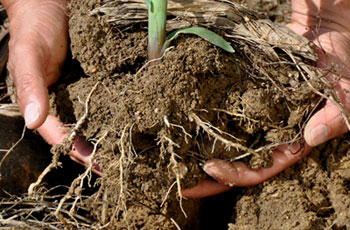5585 Guilford Road • Madison, WI 53711-5801 • 608-273-8080 • Fax 608-273-2021
www.agronomy.org
Twitter | Facebook
NEWS RELEASE
Contact: Hanna Jeske, Associate Director of Marketing and Brand Strategy, 608-268-3972, hjeske@sciencesocieties.org
Certified Soil Technician certification announced
Jan. 10, 2017 – The Soil Science Society of America (SSSA) announces a new certification program called Certified Soil Technician (CST).
 The certification will serve several purposes. “Being accredited, especially by SSSA, will help those in soils-related fields grow with their jobs,” says Luther Smith, director of certification and business development for SSSA. “It will help their employers know that, as staff, they are keeping up with industry standards. And it may provide them with an opportunity for job growth.”
The certification will serve several purposes. “Being accredited, especially by SSSA, will help those in soils-related fields grow with their jobs,” says Luther Smith, director of certification and business development for SSSA. “It will help their employers know that, as staff, they are keeping up with industry standards. And it may provide them with an opportunity for job growth.”
“There are many people doing soils-related work who may not have the formal education to qualify for the full ‘certified professional soil scientist’ program,” says Smith. “They may have a bachelor degree or higher but not all of the soil science coursework. Or, they may have years of experience and are currently in positions where most of their time is spent doing soils-related work. The certifications will help the technician grow in their expertise, and make sure they stay abreast of new techniques.”
These individual do not qualify for Certified Professional Soil Scientist certification (CPSS), due to the course work requirement. There was no prior certification that would meet their needs as professionals.
CST requires passing the fundamentals in soil science exam, with three years of experience. The education requirement is an associate degree with at least seven semester credits in soils along with three references. The certificant will also have to sign the same code of ethics as that for a CPSS. CST does not replace or compete with CPSS. Each has different requirements and CST could be a step towards CPSS if the individual decided to return to school to earn the necessary course work.
Like many professions, CST and CPSS have different levels of knowledge and skill proven through examination and documentation of experience and education. Jobs follow the same pattern so it is not expected that a CST would be doing the same things as a CPSS. Each certification will serve different audiences some that might be new to SSSA.
CST will not be available in states that have state soils licensing programs. Please check the web site www.soils.org/certifications for more details about soil certification programs, as well as the licensing states’ requirements. Practitioners in soil science licensing states should follow state-specific procedures to become licensed.